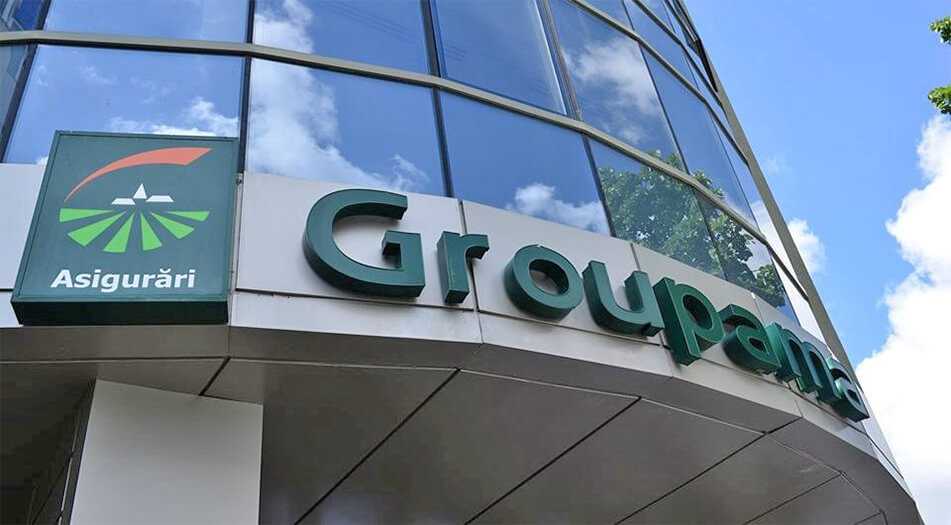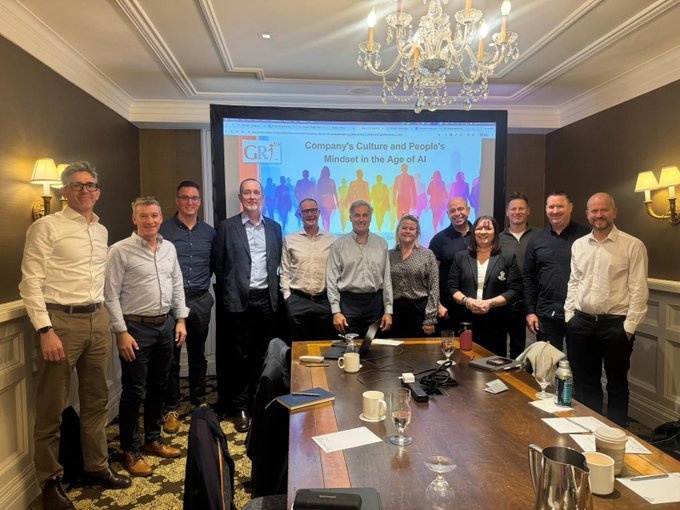Groupama Successful Transformation in Romania: The GRI, Catalyst for Profound Change
Posted by Frederic Lucas-Conwell

Groupama's Successful Transformation in Romania: The GRI, Catalyst for Profound Change
The history of Groupama in Romania is an eloquent testament to resilience, strategic vision, and the transformative impact of innovative management tools. Arriving at the end of 2011 as a new CEO, François Coste faced a highly precarious situation: consolidating three recently acquired, loss-heavy companies.
Under his guidance, Groupama in Romania not only quickly became profitable but also became the market leader. This challenge, which François and his team successfully met, highlights leadership and the central role of the GRI (Growth Resources Institute) approach in this metamorphosis.
This article explores the different phases of this deep transformation, the integration of complementary tools such as Six Hat Thinking and the Lean program, and how the GRI established itself as the pillar of a cultural and organizational revolution.
From Fragile Foundations to Survival: The Crucial First Step
When François Coste took over as CEO of Groupama Romania, the situation was critical. The company was accumulating very heavy losses, and several capital injections were necessary to remain solvent. His initial mission was clear: to ensure the company's survival. With 32 years of international experience at renowned companies such as AXA and Michelin, François initiated, with his executive team, a massive, bold restructuring.
"My team and I closed 350 agencies, cut 1,000 salaried jobs, and let go of 5,500 tied agents," says François Coste. These decisions, although difficult, were vital to getting things on track. The product range was deeply reviewed, risk exposure was reassessed, and rigorous overhead management was implemented. This hard work paid off: in 2014, Groupama Romania recorded its first profit, a symbolic victory after years of abysmal losses. This "survival" phase is proof that a profound transformation often begins with courageous measures and an unwavering will to face reality.
Opting for Quality to Stand Out in a Challenging Market
Once survival was assured, the company entered a phase of development. The Romanian market was then characterized by dumping in Motor Third Party Liability insurance, resulting in fierce, often unfair competition. Rather than engaging in a price war, Groupama opted for a differentiating strategy: quality.
François Coste explains this approach: "Romania was a country at the time where consumers were not really sensitive to quality. So everything was about price. And obviously, when you lose a lot of money, you don't have the ammunition to fight on price. So we had to create another strategic horizon or another competitive plan, and that was quality at a fair price."
The company implemented "service guarantees, service commitments," offering tangible proof of its commitment to the customer. This strategy paid off: Groupama became the leader in Home insurance and the preferred insurer of brokers, demonstrating that a quality-driven value proposition can transcend the most complex market dynamics.
The Pinnacle of Leadership: Overcoming Shocks and Consolidating Position
The 2019-2022 period was marked by major new challenges, including the bankruptcies of leaders in Motor Third Party Liability insurance, which left a colossal €2 billion capital deficit to be absorbed by the remaining players. Groupama Romania, far from faltering, brilliantly overcame these successive shocks.
In 2022, the company became the market leader, and in 2025, the turnover is reaching €1 billion with a profit of €100 million. This success isn't just financial. Groupama Romania is also recognized as the "preferred employer," boasting the highest employee engagement rate in the Group. François Coste emphasizes the importance of this human dimension: "We really had to work on the value proposition, to be the preferred employer, to ensure that talent would come to us and that our employees would be loyal."
This "winning" phase is the culmination of a holistic transformation in which economic performance and human engagement go hand in hand. This is essential as the insurance industry is about people serving people.
The GRI at the Heart of Transformation: Collaboration, Diversity, and Dynamism
According to François Coste, the GRI approach has been "a tool to successfully achieve our transformation from several angles," positioning it as an essential catalyst for this metamorphosis.
- Strengthening Collaboration and Productive Diversity: The GRI has enabled a better understanding of adaptive profiles within the management team, thus promoting more effective collaboration and "productive diversity” as a source of performance. François Coste emphasizes this point: "To collaborate, you have to know the other people well. You have to respect them and their differences. So, knowing the other person's adaptive profile, respecting it, knowing that there are several profiles. That's important. So it has strengthened collaboration. It has allowed us to have productive diversity."
- Integrating "Six Hat Thinking" has also helped manage the tensions inherent in decision-making within an executive team with diverse profiles. The goal wasn't to change the profiles, but to understand them and use them as a strength.
- Instilling Dynamism: The GRI approach brought crucial dynamism to the leadership team, a major asset in an emerging market. This understanding of behaviors allowed the team to "solve problems faster and seize opportunities faster."
- Formalism and Cultural Revolution: Beyond individual understanding, the GRI supported the establishment of a rigorous formalism, essential for managing the complexity of the company (1,600 people, 16,000 distributors, multiple insurance branches). This formalism, combined with GRI's open-mindedness, was fundamental to implementing the Lean program.
- HR Involvement and Strategic Recruitment: Human Resources drove the introduction of GRI and actively used GRI’s adaptive profile to recruit "key profiles for transformation, such as project managers, lean navigators, etc." This targeted approach ensured that the right people were in place to lead the change.
The Lean Program
Alongside the GRI, a comprehensive six-year Lean program (2015-2020) was rolled out, profoundly transforming working methods at the company. This program introduced principles of continuous improvement and reinvented how teams collaborate and are managed.
One of the most significant innovations was the implementation of “activity and results” dashboards. "At first, we put the dashboards on the walls, allowing for a quick meeting in front of them. And then, the team meeting taking place in front of the dashboard helped spark a bit of a revolution," recalls François Coste. This approach, in which employees wrote their own results, fostered deeper learning and increased engagement. The Lean program also invited each employee to be an "agent of change," generating 600 implemented improvement ideas, contributing to a true cultural revolution within the company.
Values-Behavior Alignment and Lessons Learned
François Coste emphasizes the importance of aligning corporate and individual values with behavior to achieve greater impact and a "virtuous circle." The GRI, by working on social behavior, has been a key lever for this alignment.
The discussion highlighted the power of GRI's tools and methods compared to many others on the market. Mihai Moghior, the consultant who implemented GRI at Groupama, emphasizes the HR team's role in deploying GRI across the organization, analyzing teams, and delivering accurate, in-depth analyses. Mihai recalls “the culture evolved over time to be more participative and inviting anyone into the discussion. This evolution clearly showed from the top and the adaptive profiles when everyone retook the GRI five years later, in 2021.”
Judith Kis, Groupama Romania’s director of human resources, and her team played a critical role in leading the transformation efforts alongside François Coste. GRI offered strong capabilities to align people's strengths with the corporate strategy and accelerate the organization's transformation.
Looking back, François Coste expresses only one regret: "I should have been much quicker and more determined in setting “how we work in this company.” He acknowledges having wasted time by being "perhaps too respectful" and cautious at the beginning of his mission, not knowing Romania, emphasizing the importance of clear normative communication from the outset.
Transformative Success
The transformation of Groupama in Romania under the leadership of François Coste is an inspiring example of how a company can not only survive extreme challenges but also thrive and become a leader. Success relies on a combination of visionary leadership and innovative strategies, such as a focus on quality. GRI is certainly only one of many tools Groupama Asigurari has used to build its success in Romania, but being able to accurately assess human performance and social behavior and apply this knowledge to strategic decisions and day-to-day leadership makes a difference.
François Coste and his team not only transformed structures and processes but also initiated a profound cultural revolution grounded in employee understanding, respect, and engagement. This experience demonstrates that, when strategically integrated, assessment techniques with appropriate attributes can become true catalysts for sustainable performance and significant impact.
Artículos Recientes (En)
Hybrid Work: A Management Revolution
The COVID-19 pandemic has acted as an unprecedented catalyst, radically transforming our approach to work. What was once a marginal practice has become the norm for many...
Leadership 3.0: Objective Insights for People-Centric Leaders
Steve, a brilliant entrepreneur, poured his heart into his work. His team at "Innovatech" was on the brink of a major breakthrough, a new app that promised to revolutionize...



